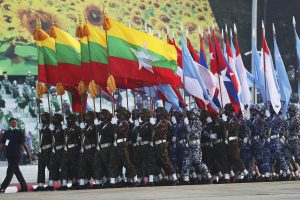Days after the Myanmar military coup on February 1, 2021, the Japanese and Australian governments publicly “confirmed” they would “closely coordinate together regarding the situation in Myanmar.” Since then, they have repeatedly expressed “grave concerns” about human rights abuses in Myanmar while pledging to “work together closely.”
On March 3, Australia adopted new regulations that give it the ability to sanction Myanmar entities and individuals connected to the junta. This is long overdue given that in the past year Myanmar’s military has killed 1,700 people and arbitrarily arrested thousands. Sadly, it’s still an open question whether Australia or Japan will do much more than continue to talk tough and do little about the region’s deepening human rights crisis.
The two regional partners have taken some small steps on Myanmar. Japan issued statements condemning the coup and froze new non-humanitarian aid, while its Diet passed a resolution calling for the restoration of a democratic system. Similarly, Australia redirected its aid program away from junta-related entities and suspended its defense cooperation with Myanmar. A parliamentary committee examining Australia’s response to the coup urged the government to further pursue the restoration of civilian rule as a foreign policy objective.
However, Tokyo and Canberra have failed to coordinate with democratic allies such the United Kingdom, United States, European Union, and Canada in taking further concrete action to pressure the Myanmar military, or Tatmadaw. Rather than imposing targeted sanctions on military leaders and military-owned entities, as the four allies have done, Japan and Australia have effectively bet all their chips on the Five-Point Consensus of the Association of Southeast Asian Nations (ASEAN) and the principle of “ASEAN centrality.” It’s been a losing bet.
Since ASEAN released its five-point consensus last April, there has been no progress on any of the listed issues. The junta has been unwilling to meet even ASEAN’s low bar, and instead has exploited the international community’s deference to ASEAN to keep delaying any substantive action. Meanwhile, Tokyo and Canberra conveniently hide behind the ASEAN fig leaf, refraining from enacting targeted sanctions, and thus undermining the international community’s efforts to hold the Tatmadaw accountable for its atrocities.
In late March 2022, Cambodia’s foreign minister and ASEAN’s special envoy, Prak Sokhonn, met Myanmar military leader Min Aung Hlaing to advocate for the five-point consensus, including a ceasefire. However, Prak Sokhonn himself claimed there was little progress. Myanmar’s junta barred Sakonn from meeting with Aung San Suu Kyi and other imprisoned leaders of the National League for Democracy party, which won the November 2020 election in a landslide.
In January, the United Nations high commissioner for human rights, Michelle Bachelet, said that “the actions taken by the U.N. Security Council and by ASEAN have been insufficient to convince Myanmar’s military to cease its violence.” Tokyo and Canberra should heed her call.
Since early 2021, Japan’s ruling and opposition lawmakers have discussed passing a U.S. Magnitsky-style law, which would allow the Japanese government to sanction violators of international human rights outside of the country. Late last year, Prime Minister Kishida Fumio said he will continue to “consider” such a law. Lawmakers have also advocated using the Foreign Exchange and Foreign Trade Act, predominantly used to sanction human rights violators in response to U.N. Security Council resolutions.
But the Japanese government remains passive about imposing sanctions. Last April, then-Foreign Minister Motegi Toshimitsu disparaged the idea of coordinating with other countries to sanction Tatmadaw leaders, claiming without evidence that it would not lead to a “productive outcome.”
Australia, meanwhile, passed the Autonomous Sanctions Amendment Act in late 2021, enabling the government to impose targeted financial sanctions and travel bans. The government said that the new law will allow it to “respond more flexibly and swiftly to a range of situations of international concern, including in collaboration” with Australia’s close allies and partners when in the national interest. Despite pressure from civil society groups and opposition politicians, the government has been unwilling to use the new measures against the Myanmar junta.
The Australian government has said that Myanmar’s junta is “impervious” to international pressure and that sanctions would provide “very little, if any, positive impact to the people on the ground.” But this ignores calls by Myanmar’s people for targeted sanctions and the tangible role that sanctions played in the previous decade in pressuring the military to embark on the reform process. In their decision to embrace Myanmar’s shaky democratization, other governments eased the pressure too early.
Past blanket sanctions were devastating for ordinary people in Myanmar, meaning that coordinated and targeted sanctions with robust enforcement will be key. The military’s financial interests and relationships have become more integrated into the global economy, offering even greater opportunities for effective sanctions.
With the necessary laws in place, the stage is set for Japan and Australia to do more than simply deflect and defer to ASEAN. Tokyo and Canberra should swiftly place targeted sanctions against Tatmadaw leaders and military-owned entities. In addition to sanctions, the two democracies should also push other governments to support a U.N. Security Council resolution calling for an arms embargo on Myanmar. Myanmar’s junta needs to be shown there are both immediate and longer-term consequences for their grievous abuses.

































